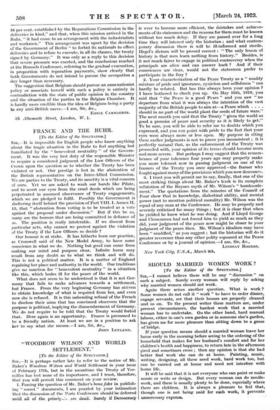"WOODROW WILSON AND WORLD SETTLEMENT."
[To the Editor of the SPECTATOR.]
SIR,—It is perhaps rather late to refer to the notice of Mr. Baker's Woodrow Wilson and World Settlement in your issue of February 17th, but in the meantime the Treaty of Ver- sailles has lost none of its importance, and I trust, therefore, that you will permit this comment on your review.
1. Passing the question of Mr. Baker's bona fides in publish- ing " secret " documents, I am puzzled by your intimation that the discussion of the Paris Conference should be deferred until all of the princip-:.: are dead. Surely if Democracy is ever to become more efficient, the mistakes and achieve- ments of its statesmen and the reasons for them must be known without too much delay. If they are passed over for a long time they will interest only the historian ; and what contem- porary discussion there is will be ill-informed and sterile. Hegel's dictum will be proved correct : " The only lesson of history is that men learn nothing from history." Besides, is it not much fairer to engage in political controversy when the principals are alive and can answer back ? And if their consciences are clear, would not the statesmen prefer to participate in the fray ?
2. Your characterization of the Peace Treaty as a " muddy mixture of pride and ignorance, cynicism and selfishness " can hardly be refuted. But has this always been your opinion ? I have bothered to check you up. On May 10th, 1919, you said that " the Peace is a good Peace " and you saw " no departure from what it was alWays the intention of the vast majority of the British people to aim at—a Peace which . . . . should in no part of the world plant the seeds of future wars." The next month you said that the Treaty " gives the world as good a promise of peace and security as it is likely to get." To be sure, you will be able to refer me to doubts which you expressed, and you can point with pride to the fact that your eyes were always more or less open. My purpose in citing these earlier judgments is not to prove you inconsistent ; it is perfectly natural that, as the enforcement of the Treaty was proceeded with, your opinion of its terms should become more and more severe. But perhapS I may suggest that the remem- brance of your tolerance four years ago may properly make you more tolerant now in passing judgment on one of the framers of the Treaty you once approved—the framer wha fought against many of the provisions which you now denounce.
8. I trust you will permit me to say, finally, that one of the most striking things about Mr. Baker's book is its complete refutation of the Keynes myth of Mr. Wilson's " bamboozle- ment." The quotations from the minutes of the Council of Four show that in knowledge, dialectical ability, and mental power (not to mention political morality) Mr. Wilson was the equal of any man at the Conference. He may be properly and severely criticized for many things ; but it is clear that when he yielded he knew what he was doing. And if Lloyd George and Clemenceau had not forced him to yield as much as they did, your judgment of the peace now might be closer to your judgment of the peace then. Mr. Wilson's idealism may have been " muddled," as you suggest ; but the historian will do it greater reverence than any other polity espoused at the Peace Conference or by a journal of opinion.—I am, Sir, &c.,


































































 Previous page
Previous page